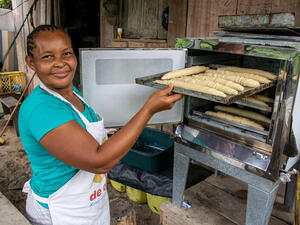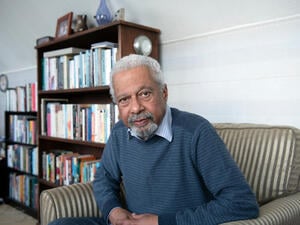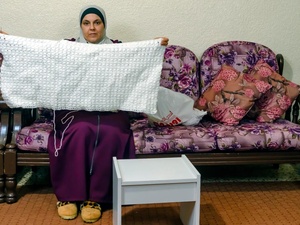Year of return and partnerships, but challenges remain, says Lubbers
Year of return and partnerships, but challenges remain, says Lubbers

High Commissioner Ruud Lubbers at a press conference in Geneva after he closed the 55th annual session of UNHCR's Executive Committee.
GENEVA, Oct 8 (UNHCR) - Hailing 2004 as the year of return and partnerships, UN refugee agency chief Ruud Lubbers today stressed the need for greater burden-sharing in the face of challenges like restrictive asylum policies, continuing violence and irregular secondary movements of people.
The High Commissioner made these comments at the close of the 55th annual session of UNHCR's Executive Committee in Geneva on Friday.
"2004 was referred to as 'the year of return'," Lubbers told UNHCR's 66-nation governing body, pointing to the large and successful repatriation operations in Africa, the countries of the former Yugoslavia and Afghanistan. "I share your satisfaction at the decline in the number of refugees and asylum seekers, as well as the conviction that much remains to be done."
Some member States had expressed "fear that a generalised trend toward more restrictive policies could hinder the consolidation of the asylum regime and its effective implementation," said Lubbers, who saw this less friendly climate as an impetus to strengthen implementation of the Agenda for Protection.
"This includes preserving humanitarian space in face of the challenges posed by deteriorating security environments, for example in the Caucasus, and the mischaracterisation of international refugee instruments as providing a safe haven for terrorists, rather than specifically providing for their exclusion from refugee protection, as they actually do," he elaborated.
The phenomenon of mixed flows also came up during the debate. Using North Korea as an example, Lubbers said, "Our response must be to ask how anyone can be certain there are no refugees in a given group."
The issue is currently in the spotlight with the deportation of new arrivals on Italy's Lampedusa island to Libya. "Finally, we have access to Lampedusa but let's be honest: it's a bit too late," said Lubbers, adding that UNHCR has also been denied access to asylum seekers in Libya.
He noted that from UNHCR's perspective, the Mediterranean issue has three components. First, to build up protection capacity in north African States. Second, to cope with people intercepted on the high seas through a responsibility- and burden-sharing system. Third, to ensure that individuals who have entered a European Union member state will be treated and screened in conformity with the Tampere principles.
The High Commissioner stressed that States should not forget humanitarian and legal standards while protecting their interests: "We must be guided by a desire to share, not shift, the burden."
Burden-sharing is one of the key elements of the Convention Plus initiative for durable solutions. "Convention Plus is no longer a promise for the future. It is a reality today," said Lubbers. "We have made considerable strides since the introduction of Convention Plus two years ago, both on burden-sharing and solutions for more refugees, as well as developing tools to do even better."
Also relevant is the "4Rs" programme of repatriation, reintegration, rehabilitation and reconstruction for refugees. "Several delegations, particularly representatives from Africa, spoke of the need to break the cycle of violence in order to make refugee return sustainable," said Lubbers. "I salute the focus of the African Union on the security dimension. There can be no development if violence is allowed to continue. I observe more and more implementation of the 4Rs, not only by UNHCR, but more importantly, by the UN and international financial institutions."
There is a need to consolidate existing successes, he said. In south-eastern Europe, this includes "ensuring right to return for everyone who chooses to, supporting local integration, and the transition to reconstruction."
In Afghanistan, "the unprecedented registration of refugees for tomorrow's Presidential election - over 750,000 voters in Pakistan alone - demonstrates clearly that the international community cannot afford to walk away from the reconstruction of that country," said the High Commissioner.
He welcomed a pledge by European Commission for continued financial assistance to the Afghanistan Comprehensive Solutions initiative, which will help UNHCR to expand the discussion to non-neighbouring countries that host Afghans. "I repeat, not all Afghans abroad should be forced to go home. There are Afghans who are able to contribute - if only temporarily - to the economy of their host states," he said.
He also reiterated the refugee agency's commitment to finding solutions for long-running situations like Great Lakes and Burundi - "which stand at historical crossroads" - as well as Somalia, the Bhutanese in Nepal and displaced Colombians.
Looking back on this year's Executive Committee meeting which started on Monday, Lubbers said, "This was a partnerships ExCom." He noted UNHCR's co-sponsorship of UNAIDS and its work with the World Food Programme to fight the problem of food shortage for refugees. Non-governmental and regional organisations like the African Union are also valuable partners, he added.
On UNHCR's funding situation, the High Commissioner thanked donors for their contributions and UNHCR's improved outlook. However, he cautioned, "Although we have received $10 million in contributions since my appeal two weeks ago, our 2004 Annual Budget still has a shortfall of some $60 million.... As the Netherlands put it, our funding situation has improved but remains precarious."









